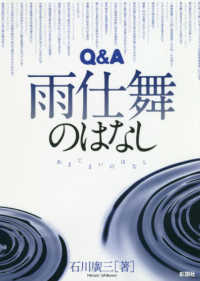- ホーム
- > 洋書
- > フランス書
- > LITTERATURE GENERALE
- > Oeuvres classiques
- > Moderne (<1799)
基本説明
Natalie ROULON
Music and Gender in All's Well That Ends Well
All's Well That Ends Well may not be the most musical of Shakespeare's works, but the music performed or referred to in the play is important in that it contributes to constructing the strict gender divide which prevailed in the society whose tensions this "problem comedy" reflects. Masculine music is martial, self-centred, and tends to reveal the principal male characters' anxieties about feminine desire. Although the female characters are not presented as musicians, in many productions they are accompanied by soft stringed instruments when they appear onstage. Helen is associated with music in male discourse and is cast as the play's main, albeit paradoxical, harmonising figure. Whereas the King of France's male physicians have failed to restore his health, Helen successfully devises a musical cure for him and is therefore granted her request to choose Bertram for her husband. However, in spite of the immense power Shakespeare has endowed her with, this Orphic woman comes up against a patriarchal structure which leaves limited scope for female agency and gender reversal, hence the lingering doubts, even once the play has ended, as to her ability to attain unalloyed marital bliss.
Bien que All's Well That Ends Well ne soit pas la plus musicale des œuvres de Shakespeare, la musique qui y est interprétée où à laquelle il est fait référence est importante dans la mesure où elle contribue à la construction de la division des genres qui prévalait dans la société dont les tensions se trouvent reflétées dans cette problem comedy. La musique des hommes est martiale et narcissique et tend à -mettre au jour l'angoisse qu'éprouvent les principaux personnages masculins à l'endroit du désir féminin.







